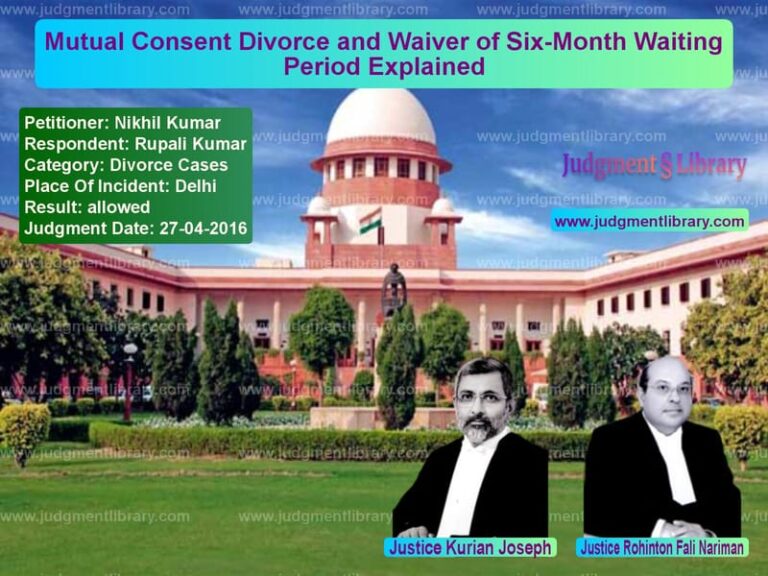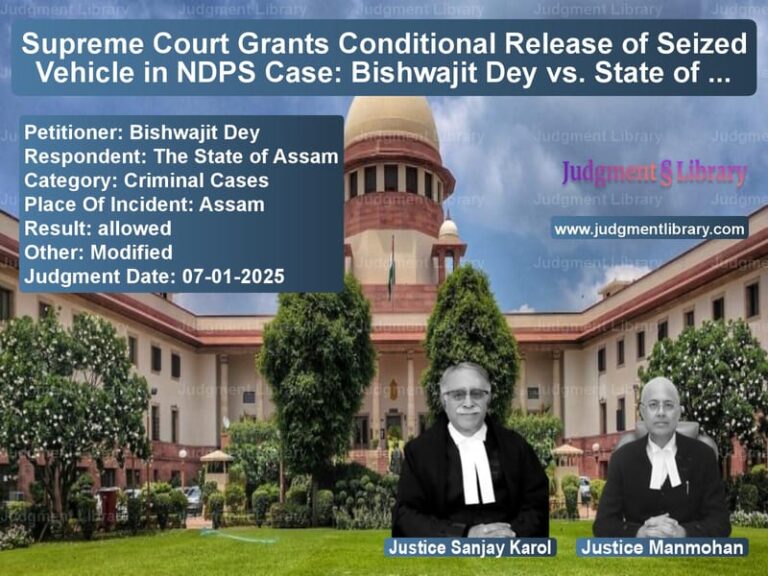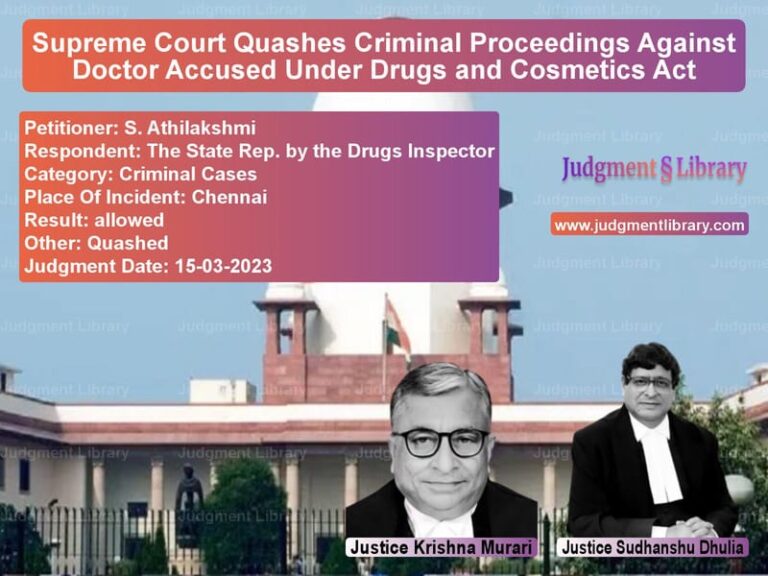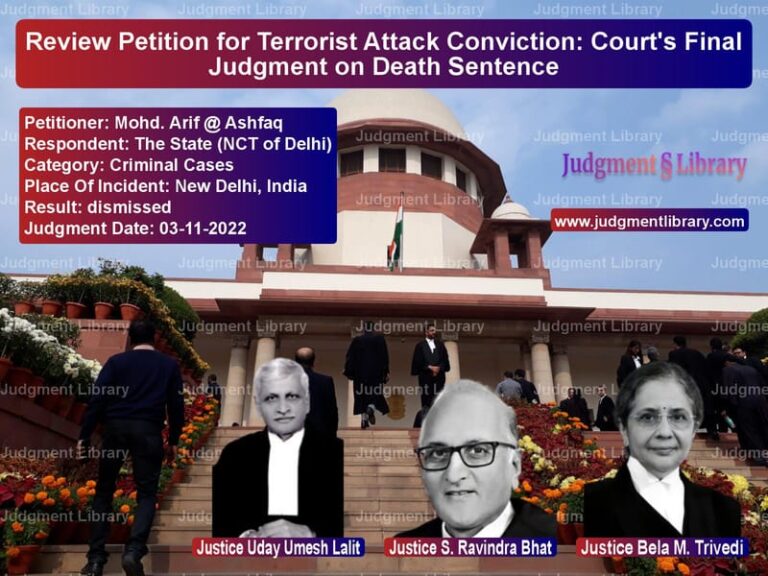Land Compensation Dispute: A Case Review of Compensation for Acquired Lands in Haryana
This case involves the landowners’ appeal against the decision of the Punjab and Haryana High Court regarding the compensation for lands acquired under the provisions of the Land Acquisition Act, 1894, for the establishment of a Liquified Petroleum Gas (LPG) plant at Bhondsi in Haryana. The landowners, who were dissatisfied with the compensation awarded for their acquired lands, sought higher compensation based on sale exemplars of comparable lands in the region. The High Court had enhanced the compensation to Rs. 7,00,000 per acre, but the landowners sought further enhancement based on other sale exemplars. This case highlights the complexities involved in determining fair compensation for land acquisition and the principles followed by the courts in such matters.
Background of the Case
The lands in question, located within the revenue estate of Village Bhondsi, Tehsil Sohna, District Gurgaon, were acquired under the Land Acquisition Act, 1894, for the setting up of an LPG plant by the Indian Oil Corporation. The notification under Section 4 of the Act was issued on June 19, 1996, and the Land Acquisition Officer initially determined compensation at Rs. 5,30,000 per acre for irrigated lands and Rs. 2,00,000 per acre for non-irrigated lands. The Reference Court later set the compensation at Rs. 5,30,000 per acre for both irrigated and non-irrigated lands. The landowners, dissatisfied with this, appealed to the High Court, which enhanced the compensation to Rs. 7,00,000 per acre. However, the landowners, seeking even more, filed appeals for further enhancement based on the sale instances they provided.
Petitioner Arguments
The landowners argued that the compensation awarded by the High Court was still insufficient and failed to reflect the true market value of the lands. They relied heavily on several sale exemplars (Ex. P1 to Ex. P10) which they argued were comparable to the acquired lands. The landowners particularly focused on Sale Deeds Ex. P3 and Ex. P4, which were executed for lands in the same vicinity and for similar purposes. They argued that these sale instances demonstrated a significantly higher market value for lands in the area and that the compensation should be accordingly enhanced to reflect the current market conditions.
The landowners contended that the High Court had erred in discarding the sale exemplars Ex. P3 and Ex. P4. They claimed that these sale deeds were genuine and accurately reflected the value of the lands in the region. Moreover, they pointed out that the land in question was being acquired for the purpose of establishing an LPG plant, which had a significant impact on the value of the land due to the nature of its use.
Respondent Arguments
The respondents, representing the acquiring body and the Indian Oil Corporation, defended the compensation set by the High Court. They contended that the sale exemplars provided by the landowners were either not comparable or not relevant for determining the compensation. The respondents highlighted that the sale deed Ex. R12, which they relied upon, was a more accurate reflection of the land value in the area. They argued that the High Court had correctly considered this sale deed in arriving at the compensation of Rs. 7,00,000 per acre and that the landowners’ claims for a higher compensation were unjustified.
The respondents further argued that the landowners’ reliance on sale deeds executed by or in favor of M/s. Orient Express Pvt. Ltd. was flawed, as it involved transactions between a private party and a company, which could have influenced the sale price. The respondents emphasized that such sales should not be used to determine compensation for land acquisition by the government.
High Court’s Judgment
The High Court had initially enhanced the compensation from the amount awarded by the Reference Court, setting it at Rs. 7,00,000 per acre for both irrigated and non-irrigated lands. In doing so, the Court had considered the sale exemplars produced by the landowners, including Ex. P1 to Ex. P10, and dismissed Exs. P3 and P4, deeming them not genuine due to variations in price and the parties involved in the transactions. The Court relied on Ex. R12, a sale instance produced by the respondents, to justify the enhancement of compensation to Rs. 7,00,000 per acre.
However, the High Court’s decision was challenged by the landowners, who sought a further enhancement based on their sale instances. The Court also dismissed the contention that the sale instances by M/s. Orient Express Pvt. Ltd. were not valid, questioning the High Court’s reasoning behind discarding these sale deeds.
Supreme Court’s Judgment
The Supreme Court reviewed the case and found that the High Court had made an error in discarding the sale exemplars Exs. P3 and P4. The Court noted that while the sales involved M/s. Orient Express Pvt. Ltd., which could have influenced the sale prices, it did not justify outright dismissal of the sale deeds as not genuine. The Court held that the price variation between the sale deeds should not have been a basis to disregard them entirely. Instead, it was reasonable to consider these sale instances in determining the market value of the acquired lands.
The Court also acknowledged that the lands were being acquired for the purpose of setting up an LPG plant, which required minimal development compared to other uses, such as residential or commercial development. Taking this into account, the Court directed a deduction of 35% from the prices reflected in Ex. P4 to account for the smaller land area and the nature of the development required. The Court then concluded that the fair compensation for the landowners was Rs. 12,16,800 per acre, which was a reasonable enhancement from the Rs. 7,00,000 per acre decided by the High Court.
Key Points of the Judgment
- The Supreme Court held that the sale exemplars Ex. P3 and Ex. P4, although involving a company, were valid and should not have been dismissed by the High Court.
- The Court recognized the minimal development required for the acquired lands, as the purpose was to set up an LPG plant, justifying a 35% deduction in compensation based on the smaller land area and development requirements.
- The Court enhanced the compensation to Rs. 12,16,800 per acre, a fair reflection of the market value of the lands based on the sale instances provided by the landowners.
- The Supreme Court modified the High Court’s judgment and directed the payment of compensation at Rs. 12,16,800 per acre with all statutory benefits.
- The Court emphasized that fair compensation for land acquisition should be determined by considering all relevant sale instances and not discarding them solely based on price variations.
Conclusion
This judgment reaffirms the importance of using accurate and representative sale instances in determining compensation for acquired lands. The Supreme Court’s decision to enhance the compensation reflects a fair approach to evaluating the market value of lands, especially when the acquired land is intended for industrial purposes like setting up an LPG plant. The judgment also emphasizes the need for careful consideration of all factors, including the development requirements and the nature of the acquisition, in determining just compensation for landowners.
Petitioner Name: Hari Ram (Deceased) Thr. His LRs. and Anr..Respondent Name: Land Acquisition Collector cum District Revenue Officer Gurgaon and Ors..Judgment By: Justice M.R. Shah, Justice M.M. Sundresh.Place Of Incident: Haryana.Judgment Date: 20-10-2022.
Don’t miss out on the full details! Download the complete judgment in PDF format below and gain valuable insights instantly!
Download Judgment: hari-ram-(deceased)-vs-land-acquisition-col-supreme-court-of-india-judgment-dated-20-10-2022.pdf
Directly Download Judgment: Directly download this Judgment
See all petitions in Contract Disputes
See all petitions in Property Disputes
See all petitions in Consumer Rights
See all petitions in Damages and Compensation
See all petitions in Landlord-Tenant Disputes
See all petitions in Judgment by Mukeshkumar Rasikbhai Shah
See all petitions in Judgment by M.M. Sundresh
See all petitions in partially allowed
See all petitions in supreme court of India judgments October 2022
See all petitions in 2022 judgments
See all posts in Civil Cases Category
See all allowed petitions in Civil Cases Category
See all Dismissed petitions in Civil Cases Category
See all partially allowed petitions in Civil Cases Category







